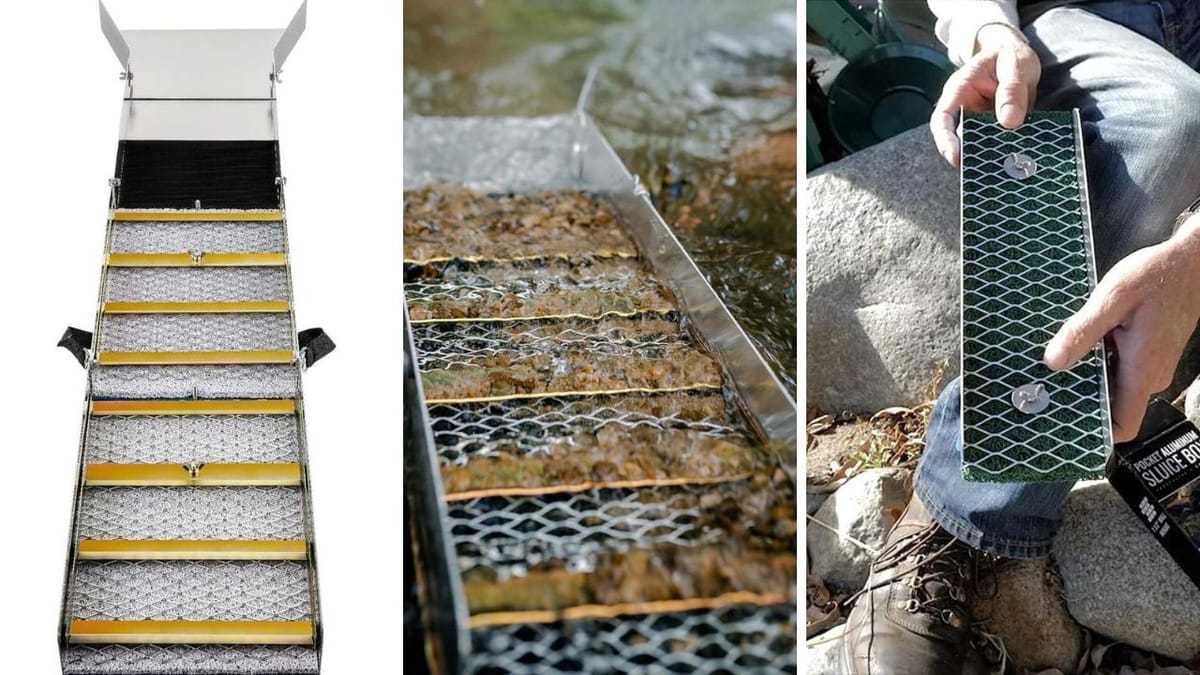Gold has captivated humanity for millennia, not just as a symbol of wealth but also as a sought-after material for jewelry, coins, and various artifacts. With the advent of metal detecting technology, the quest for this precious metal has become more accessible to enthusiasts and professionals alike.
But the question remains: do metal detectors detect gold? Let's delve into the capabilities of modern metal detectors and how they can be your ally in the hunt for gold.
Understanding Metal Detector Technology
Metal detectors work by transmitting an electromagnetic field into the ground through a transmitter coil. When this field encounters a metal object, it generates an eddy current in the object, which in turn produces its own electromagnetic field.
The detector's receiver coil picks up this field and alerts the user. Gold, being a metal, will indeed produce such a response, making it detectable by most metal detectors.
However, gold's low conductivity compared to other metals like silver or copper means that not all metal detectors are equally efficient at detecting gold.
Specifically designed gold metal detectors often operate at higher frequencies to better detect the low conductivity metal that gold is.
The Role of Frequencies in Detecting Gold
Metal detectors come in various types, but the two most relevant for gold hunting are Very Low Frequency (VLF) and Pulse Induction (PI) detectors. VLF detectors operate using a continuous electromagnetic field and are sensitive to smaller gold nuggets and other metal objects near the surface.
They can discriminate between different types of metals, making them useful in areas with a lot of trash items like pull tabs.
PI detectors, on the other hand, use bursts of electronic pulses to penetrate the ground quickly. They are better suited for environments with highly mineralized soils and can find nuggets at greater depths than VLF detectors.
While they are less discriminatory than VLF technology, their depth and rugged environments handling make them a favorite for serious gold hunters.

Gold Metal Detectors: A Specialized Tool
Gold detectors are specifically designed to find nuggets and other forms of gold with a metal detector. These devices often incorporate newer technology that allows them to operate at multiple frequencies or a higher frequency to better detect small gold nuggets.
They also tend to have larger coils to cover more ground quickly and may include settings to handle the ground conditions where gold is typically found, such as shallow water or rugged environments.
The best metal detectors for gold are those that offer a balance between sensitivity and ground handling.
For example, the Garrett ATX is a PI detector known for its effectiveness in gold hunting, while the Bounty Hunter is a more affordable VLF option that can still find nuggets in the right conditions.
The Importance of Coil Size and Type
The search coils on metal detectors play a crucial role in detecting gold. Larger coils can search more ground quickly and may detect larger pieces of gold at greater depths.
However, they may struggle with small gold nuggets that are just a few inches from the surface. Smaller coils, while covering less ground, can be more sensitive to small pieces of gold and are easier to maneuver in tight spaces.
There are also different types of coils, such as concentric and double-D, each with its advantages in gold hunting. The choice of coil can make a significant difference in your success rate when searching for gold.

The Advantages of Pulse Induction Metal Detectors
Pulse induction metal detectors, or PI detectors, are a step above other metal detectors when it comes to hunting gold, especially in highly mineralized soils.
Unlike regular metal detectors, PI detectors send powerful bursts of current through their coils, creating a magnetic field that is not affected by the challenging ground conditions.
This technology allows them to detect gold nuggets at greater depths than VLF detectors, making them a favorite among serious gold prospectors.
PI detectors are particularly useful in areas where gold is deeply buried or where the soil contains high levels of mineralization that can confuse other metal detectors.
Their ability to ignore these minerals and focus on the conductivity of gold makes them highly efficient. However, they may not be as sensitive to small gold fragments as VLF detectors, but for larger nuggets, they are the go-to choice for many gold hunters.
The Evolution of Metal Detecting for Gold
Metal detecting has come a long way since its early days, with advancements in technology making it easier than ever to find hidden treasures. The pulse induction metal detector is a prime example of this evolution.
Unlike its predecessor, the VLF (Very Low Frequency) detector, pulse induction models send powerful, rapid bursts of electronic pulses into the ground. These pulses are not affected by most types of mineralization, and they can detect larger pieces of gold at greater depths.
This makes them particularly useful in areas where gold is deeply buried or in regions with highly mineralized soils.
However, it's important to note that while pulse induction metal detectors are excellent for locating larger nuggets, they may not be as sensitive to small flakes or fine gold jewelry as VLF detectors.
The latter operates at higher frequencies, which can detect smaller gold pieces but are more susceptible to ground mineralization interference. This is where the detectorist's knowledge and experience come into play, choosing the right tool for the conditions at hand.
For instance, a VLF detector might be the better choice in a streambed with fine gold particles, while a pulse induction model would be ideal in the desert with its highly mineralized ground.

Maximizing Your Finds with the Right Detector Settings
Understanding your metal detector's settings is crucial to maximizing your chances of finding gold. For those using a VLF detector, mastering the ground balance feature is key.
This function helps to tune out the effects of mineralization, allowing the detector to focus on the conductivity of gold. By adjusting the ground balance to suit the specific soil conditions, detectorists can greatly improve their chances of picking up signals from gold.
It's a delicate balance, though, as incorrect settings can lead to false signals or even missing the gold entirely.
On the other hand, a pulse induction metal detector typically requires less adjustment for ground conditions, making it a "turn on and go" tool in many environments.
However, users should still pay attention to the delay settings, which control the duration between the electronic pulses. A shorter delay can help detect small or thin pieces of gold, while a longer delay is better for deep, large nuggets.
By experimenting with these settings and understanding the capabilities and limitations of their detector, gold seekers can enhance their prospecting results and increase the likelihood of a rewarding find.
Gold Detector Versatility: Beyond the Nuggets
When people think of a gold detector, images of prospectors searching for nuggets in riverbeds often come to mind. However, modern gold detectors are capable of finding much more than just large pieces of gold.
They are equally adept at locating smaller items, such as a lost gold ring or other fine jewelry. This versatility makes a gold detector an invaluable tool for treasure hunters and metal detecting enthusiasts alike.
The technology in these detectors is designed to pick up on the unique conductivity of gold, distinguishing it from other metals that might be present.
Whether you're combing the beach for a gold ring lost in the sand or exploring an old battlefield for relics, a gold detector can help you uncover treasures that a regular metal detector might miss.
This capability not only enhances the excitement of the hunt but also increases the potential rewards.

Gold Rings and Jewelry: Not Just Nuggets
While many gold hunters focus on finding gold nuggets, metal detectors can also find gold rings, jewelry, and other items made of gold. These objects are often found in public places like parks and beaches, where people are likely to lose rings, coins, and jewelry.
The same principles of metal detecting apply, but the settings may be adjusted to better suit the search for lost items rather than natural gold deposits.
The Challenge of Ground Mineralization
One of the biggest challenges in gold hunting is dealing with ground mineralization. Highly mineralized soils can cause false signals and make it harder to detect gold with a metal detector.
Gold detectors often come with settings to adjust for ground mineralization, allowing the user to filter out false signals and focus on the real targets.
Understanding the ground conditions and how to adjust your detector accordingly is essential for successful gold hunting. This knowledge, combined with a detector specifically designed for gold, can greatly increase your chances of finding gold.
Price vs. Performance: Choosing the Right Detector
When it comes to gold metal detectors, there is a wide range of options on the market, each with its price point and features. The best metal detector for you will depend on your budget, the conditions you'll be hunting in, and your level of experience.
While higher-end models may offer the best performance, particularly in challenging conditions, there are also more affordable options that can still be effective in finding gold. It's important to research and compare different models to find the one that offers the best balance of price and performance for your needs.
Practical Tips for Successful Gold Hunting
Successful gold hunting with a metal detector requires more than just the right equipment. It also involves research to find promising locations, understanding the device's settings, and developing a methodical approach to searching an area.
Practicing with your detector, learning to interpret its signals, and being patient are all key to increasing your chances of finding gold. Remember, metal detecting is a skill that improves with experience, so don't get discouraged if you don't find gold right away.

Some Final Thoughts
Metal detectors can and do detect gold, and there are models specifically designed for this purpose. Whether you're searching for small gold nuggets, gold rings, or other jewelry, the right metal detector can be a valuable tool in your quest.
By understanding the technology, choosing the right device, and applying practical gold hunting techniques, you can increase your chances of striking gold.
FAQ's
Can regular metal detectors find gold?
Yes, most metal detectors can detect gold, but gold-specific detectors are better suited for this task due to their higher frequency and settings tailored for gold hunting.
What type of metal detector is best for finding gold?
The best metal detectors for finding gold are those that are specifically designed for gold hunting, such as high-frequency VLF detectors or PI detectors that can handle highly mineralized soils.
How deep can metal detectors detect gold?
The depth at which a metal detector can find gold depends on the size of the nugget, the type of detector, and the search coil used. Generally, small gold nuggets can be detected a few inches from the surface, while larger pieces can be found at greater depths.













Member discussion